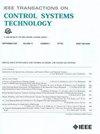Safe Control Architecture via Model Predictive Control
IF 3.9
2区 计算机科学
Q1 AUTOMATION & CONTROL SYSTEMS
引用次数: 0
Abstract
Ensuring the safe operation of autonomous systems is a critical challenge that demands the development of sophisticated control strategies. This article proposes a safe control architecture (SCA) that employs a supervisor model predictive control (MPC) (supervisor) strategy to ensure the persistent satisfaction of state and input constraints. The supervisor continuously monitors the safety of potentially unsafe inputs generated by an operating controller (OC). If an input is predicted to lead the system to a future state where constraint violations are inevitable, it is deemed unsafe and thus blocked from the system. Instead, a backup input, generated by the supervisor in the previous time step, is applied to the system. However, uncertainties in system dynamics are unavoidable and can lead to incorrect decisions by the supervisor, which is based on MPC with a nominal model. This article proposes to enhance the robustness of the SCA by the integration of tube MPC. The resulting robust SCA (RSCA) has the capability to ensure safe operation of autonomous systems under model uncertainties, making it a practical solution for safety-critical autonomous systems, such as vehicles, drones, or medical robots. This article also proves the recursive feasibility and stability of the RSCA. The effectiveness of the approach is validated for an autonomous vehicle in IPG CarMaker, a high-fidelity simulation environment with realistic data on roads, vehicle dynamics, and obstacles.基于模型预测控制的安全控制架构
确保自主系统的安全运行是一项关键挑战,需要开发复杂的控制策略。本文提出了一种安全控制体系结构(SCA),该体系结构采用监督模型预测控制(MPC)(监督)策略来确保状态约束和输入约束的持续满足。主管持续监控由操作控制器(OC)产生的潜在不安全输入的安全性。如果预测一个输入将导致系统进入一个不可避免地违反约束的未来状态,则认为它不安全,因此被系统阻止。相反,在前一个时间步骤中由主管生成的备份输入被应用到系统中。然而,系统动力学中的不确定性是不可避免的,并且可能导致管理者做出错误的决策,这是基于名义模型的MPC。本文提出通过集成管式MPC来增强SCA的鲁棒性。由此产生的鲁棒SCA (RSCA)能够确保自主系统在模型不确定性下的安全运行,使其成为安全关键型自主系统(如车辆、无人机或医疗机器人)的实用解决方案。本文还证明了RSCA递归的可行性和稳定性。该方法的有效性在IPG汽车制造商的一辆自动驾驶汽车上得到了验证,这是一个具有道路、车辆动力学和障碍物等真实数据的高保真仿真环境。
本文章由计算机程序翻译,如有差异,请以英文原文为准。
求助全文
约1分钟内获得全文
求助全文
来源期刊

IEEE Transactions on Control Systems Technology
工程技术-工程:电子与电气
CiteScore
10.70
自引率
2.10%
发文量
218
审稿时长
6.7 months
期刊介绍:
The IEEE Transactions on Control Systems Technology publishes high quality technical papers on technological advances in control engineering. The word technology is from the Greek technologia. The modern meaning is a scientific method to achieve a practical purpose. Control Systems Technology includes all aspects of control engineering needed to implement practical control systems, from analysis and design, through simulation and hardware. A primary purpose of the IEEE Transactions on Control Systems Technology is to have an archival publication which will bridge the gap between theory and practice. Papers are published in the IEEE Transactions on Control System Technology which disclose significant new knowledge, exploratory developments, or practical applications in all aspects of technology needed to implement control systems, from analysis and design through simulation, and hardware.
 求助内容:
求助内容: 应助结果提醒方式:
应助结果提醒方式:


